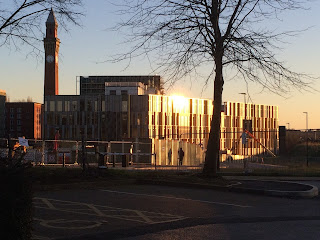Greater things from hard work
The University of Birmingham's motto is Per Ardua Ad Alta and it has never been truer as it has shown in recent months both in the conditions for learning and research and the product of these conditions.
In February 2016 I attended the official launch of the new Student Hub at the Aston Webb building and saw the care and attention that the university continues to place in looking after its students. The new hub opened at the start of the new academic year 2015-16 but the official launch saw a celebration of it's place as a holistic hub and focus of student welfare. The hub also represents a celebration of the love that went into the original university buildings, opening up the buildings for both staff and students.
The photos below show the beautiful beams of the structure revealed and the new lecture and outdoor space created for students.
Opening in the 2016-17 academic year, new Postgraduate Teaching Centre the Alan Walters Building will be devoted to the teaching of postgraduate courses in the Business School, http://www.birmingham.ac.uk/university/building/pgt-centre.aspx. The building makes an impressive welcome for students off Pritchatts Road and adjacent to the refurbished Muirhead Tower. The £10m centre is named after Sir Alan who was a lecturer in Econometrics at the University of Birmingham in 1951 and who went on to be Chief Economic Adviser to Margaret Thatcher's Government and Economic Adviser to the World Bank.
The following photos show the impressive building which adds another beautifully designed and interesting architectural addition to the University of Birmingham's rich mixture of buildings.
A short distance away, the new library is heading towards completion with an opening in Summer 2016 and allowing the demolition of the former main library to create the green heart to the campus.
The photos below show the new library under construction and glinting in the setting sun, a beacon of learning and knowledge in way that Old Joe, the clock tower, was described as the intellectual beacon of the Midlands by the Birmingham Post when it was built, http://openbuildings.com/buildings/university-of-birmingham-profile-32280?_show_description=1
All of these impressive developments and the conditions they have created and will create for learning can only help further the research achievements of the university. Recent announcements about research the university has been involved with show how important this is to it's continued important global role.
In February it was announced that scientists had discovered clear gravitational wave signal, ripples in spactime first predicted by Albert Einstein, and the University of Birmingham scientists had been involved in the discovery, http://www.birminghammail.co.uk/news/midlands-news/watch-birmingham-scientists-help-discover-10877136.
The University of Birmingham has been involved in the Advanced LIGO project since its inception. Birmingham physicists have built hardware components now installed in the LIGO instruments, they developed one of the main optical simulation tools, FINESSE, and contributed significantly to the design and commissioning of modern gravitational wave detectors. The Birmingham group has developed the techniques essential to tease out the signatures of gravitational waves from the data and has provided a major contribution to the analysis of the LIGO data.http://www.birmingham.ac.uk/research/heroes/gravitational-waves.aspx
Also in February it was announced that research by scientists at the University of Birmingham had worked alongside scientists at the University of Sheffield to find a white blood cell that was able to destroy a fatal fungal infection, Cryptococcus neoformans, which can affect people with weakened immune systems, such as those with advanced HIV, http://www.bbc.co.uk/news/uk-england-south-yorkshire-35594184.
With all of this research and the investment in facilities to help facilitate learning it was no surprise to see that the University of Birmingham was awarded £1.4m out of £23.2m awarded by the Medical Research Council to universities across the UK, http://www.birminghampost.co.uk/business/business-news/birminghams-life-sciences-ambitions-receive-10901991
The city is home to more than 500 medical technology companies, more than any other UK region, but wants to create a world-class cluster around the university and Queen Elizabeth Hospital.http://www.birminghampost.co.uk/business/business-news/birminghams-life-sciences-ambitions-receive-10901991
The funding supports the University of Birmingham's life science hub ambitions which were revealed in 2013 as it plans to create a science park on derelict land adjacent to the university and Queen Elizabeth Hospital. With a cluster of medical companies already and the region boasting the largest clinic trials base in Europe outside Oxford it is an exciting time for the University of Birmingham to use it's skills to help transform medicine globally.
I'm so proud to be an alumnus of the university and to be part of a great family of former students seeking to change the world for the better alongside those currently studying and researching.
Following our motto, let's reach even higher still.














Comments